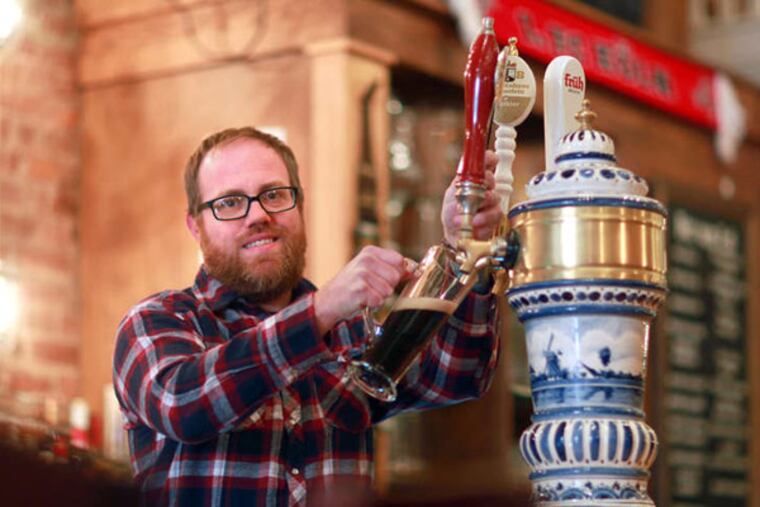Talking German cooking with Jeremy Nolen
For a city so steeped in German influence that German-inflected breweries and beer gardens, bakeries and candy makers were a big part of its personality, the Philadelphia of recent vintage had all but lost that culinary accent. Here and there - in Lawncrest and Fox Chase, on blocks of Sansom Street and in Old City and Brewerytown - you could find hints of the past in Moravian holiday clear toys and Bavarian pretzels and a sparkling butcher shop called Riekers offering weinkraut and Munich-style wieners.

For a city so steeped in German influence that German-inflected breweries and beer gardens, bakeries and candy makers were a big part of its personality, the Philadelphia of recent vintage had all but lost that culinary accent. Here and there - in Lawncrest and Fox Chase, on blocks of Sansom Street and in Old City and Brewerytown - you could find hints of the past in Moravian holiday clear toys and Bavarian pretzels and a sparkling butcher shop called Riekers offering weinkraut and Munich-style wieners.
But it wasn't until 2009 with the opening of Brauhaus Schmitz on South Street that a full-fledged, 30-tap, sauerbraten-serving German beer hall muscled back onto the mainstream dining scene. The chef presiding over the kitchen - and winning it approving nods - was Jeremy Nolen, forged in the German clubs of Berks County. Now he's about to spread his wings with a new cookbook and a tavern of his own. But first he's offering a month of Christmas dinners. In the key of German.
Q. You were born in California, where'd this German cookery come from?
A. We moved when I was four to north of Reading, in the heart of Pennsylvania Dutch country. My heritage is German-Irish, but not Pennsylvania Dutch. My dad (Ron Nolen) was a fine-dining chef, first at what was then the Sheraton Berkshire Hotel. We'd been going to one of the local German clubs and when they found out my dad was a chef they asked him to help out.
Where did you fit in?
I was 18 or 19 when I started cooking with my father in the club. I learned German food from the older volunteers. Traditional stuff like potato pancakes, bohensalat (bean salad), sauerbraten, rouladen.
You'll be cooking Christmas goose with pretzel-apple stuffing for the family-style dinners next month at Brauhaus. When did you add that to your repertoire?
At the Reading Liederkranz (club) where I started cooking on my own. I started doing a more modern or new German cooking there. We'd do a roasted half duck, with lingonberry and port wine sauce. It was sort of classic, but something they didn't use regularly at the German clubs.
You've got a cookbook coming out in January with your pastry-chef wife Jessica called "New German Cooking." Are you trying to change what you call the heavy "sausage, schnitzel, sauerkraut" impression Americans have of German fare?
We're trying to lighten things up with . . . a more fresh approach to old favorites. We take a mixed bean salad, for instance, and add a smoked paprika dressing. There are more vegetable dishes. The Mushroom and Sauerkraut Goulash is actually vegan, but only because we found that sautéing the vegetables in butter made it too greasy. So it was swapped out for canola oil.
Where do you like to eat yourself?
I like Cheu Noodle Bar. Ben Puchowitz, the chef-owner there, and I play guitar in a cover band. But Ben's opening a dumpling house, and I'm opening an American-style neighborhood tavern at Fifth and Bainbridge, so we've put it on hiatus.
What's the band called?
Big in Munich.
What's the name of your new place?
Whetstone.
So what? Will it sharpen knives, too?
No, it's my mom's maiden name.